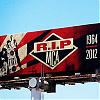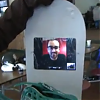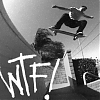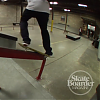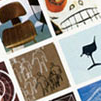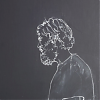goodstuff 035
productmusic
Hot Salsa
Cult Cargo: Salsa Boricua De Chicago, the latest compilation released by Grammy-nominated archival record label Numero Group digs deep into the history of Chicago’s little-known salsa recording industry. Focusing on releases from Carlos Ruiz’s storied Ebirac imprint, accompanied by detailed liner notes and a lot of dope photos, the project maintains a composed sense of history that these guys have become best known for.
This is a really cool record, what was the inspiration for developing this compilation?
No one even knew there was a salsa recording industry in Chicago whatsoever. Discoveries are what drives a lot of our directions. I was calling extremely knowledgeable salsa collectors and stumping ’em with these releases.
How did you first learn about Carlos Ruiz [colour photo, above] and the Ebirac label?
Courtland Green at Reckless Records in Chicago, which is about three blocks from the Puerto Rican Congress, is an all-purpose deejay and will jam any good tune that casts a shadow across his doorstep. He’d been playing a couple of the records on Ebirac and noticed the address was on Erie, just a few blocks away from where I live. I borrowed an LP he had and got on my bicycle and was knocking on the door of Carlos “Caribe” Ruiz’s house within minutes of even knowing about the label. Unfortunately, no one was home that time. I found out later that Caribe’s widow still lives there, but I was immediately working on finding other ways to get in touch with the family. Ruiz is a common name in Chicago, to be certain, and I was trying those in the neighborhood. I found a cousin or second cousin, she wasn’t that helpful, found another family member, they gave me a first name… I just kept plugging away for a few months. Finally, I got in touch with Judi Ruiz, who meant business from the first time I spoke to her. She was really good, really on the ball… exactly the type of person you want to be working with on a project like this. Her, her brother Joe, and her sister Nilda really came through on putting together a monumental tribute to their father.
About how long was this project in the works for?
From the moment that the label came to our attention, probably two years.
Were you able to reach out to Carlos and/or some of the band members? What was the general reaction to the project on their part?
I talked to as many band members as I could. The more I talked to, the harder it was to pin down the history of these groups. Everyone had their own take. Unfortunately, Caribe died very young back in 1987. His perspective is here, however, through his children and a few interviews we had access to.
Was this process different from other projects you’ve worked on in any way? How was the task of getting the licensing for all this music? Any more or less complicated than usual?
In a lot of ways it was easier… I barely had to leave my neighborhood. The old Puerto Rican Congress building is far easier for me to get to than the Numero office! The days I spent over there were a real treat. Lunch at Sultan’s Market instead of the tacos I eat nearly every day. The licensing wasn’t necessarily more difficult either. All these projects have their problems, but you deal with them, or you quit being a record label.
Tell me a bit about how you got started selecting the tunes to include on the record. I imagine there were a lot of tough decisions to make; any thoughts on a second volume?
We picked the tracks that we thought were the best, and compared notes amongst ourselves and some friends who collect salsa more rigorously. I also spent some time revisiting classics of the genre, Fania and Alegre stuff mostly, and thinking about the tracks that stood out as being different from the more established sounds coming out of New York and Miami. This stuff is much more tied to Puerto Rican roots than the pan-Caribbean salsa music from New York, but often times it is merely Cuba as filtered through Puerto Rico, or even New York as filtered through Puerto Rico. As far as a volume two: there is real demand for this stuff amongst salsa collectors and fans, so there’s a very strong possibility we’ll do something for that market.
With this record, and the Willie Wright release, I’ve really enjoyed seeing you guys work with some genres that a lot of people aren’t super familiar with on a listening level. How have you guys found the experience of putting those two projects together?
The Willie Wright project was an example of a record we listened to for a long time, over the years, and when it became possible to do—another collector, Brooklyn’s Ari Leichtman, tracked Willie down and courted him for the project—we just jumped on it. It had to be done. It was sort of a gamble because it always struck me as a record that takes multiple listens to really “get”, and those type of records don’t do great when listening stations and 30 second clips are how people shop for music now.
Have you got any thoughts on other areas of music you might explore in the future?
There are no restrictions… except that it has to be recorded before, I’d say, 1990. I’m looking at some very interesting electro and rap. It has to have the right quality and significance to make the final cut, however.
—Omar Almufti, 06 April 2011
SHARE: FACEBOOK TWITTER LINKEDIN STUMBLEUPON G+
HOME
contents


